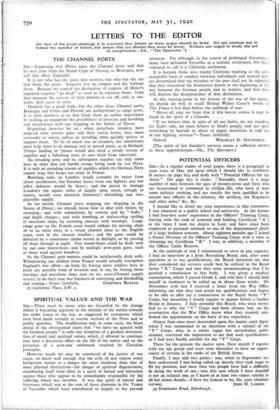LETTERS TO THE EDITOR
[In view of the paper shortage it is essential that letters on these pages should be brief. We are anxious not to reduce the number of letters, but unless they are shorter they must be fewer. Writers are urged to study the art of compression.—Ed., " The Spectator."] THE CHANNEL PORTS
Six,—Supposing that Hitler takes the Channel ports and that his writ runs from the North Cape of Norway to Boulogne, how will that affect England? It is not who has the ports that matters, but who has the sea that feeds the ports. Seaports live on cargoes and die without them. Because we control the destination of cargoes, all Hitler's captured seaports " go dead " as soon as he captures them : from that moment the current of their imports is cut off, and, as sea- ports, they cease to exist.
Dunkirk has a good trade, but the other three Channel ports, Boulogne and Calais and Ostend, are unimportant as cargo ports. It is their nearness to us that lends them an undue importance by making us exaggerate the possibilities of invasion and bombing and interference with our shipping in the Straits of Dover.
Regarding invasion by air ; when parachute invaders have emptied their tommy guns and their ration boxes, they must surrender or starve, unless an invading army quickly arrives to support them. To be of much use as' invaders, the inhabitants must help them to do damage and to spread panic, as in Holland. Troops landing in 'planes would also need a steady stream of supplies and a following army to save them from surrender.
An invading army and its subsequent supplies can only come here in ships that can hardly escape being sunk by our Navy. It is only an unending stream of supplies which the German Navy cannot stop, that keeps our army in France.
Bombing raids on London would certainly be easier from closer aerodromes, but German losses from our fighters and our other defences would be heavy ; and the petrol to damage London's 70o square miles of largely open space, enough to matter, would soon diminish Germany's dwindling and irre- placeable supply.
As for hostile Channel ports stopping our shipping in the Straits of Dover ; we already know how to deal with mines, by sweeping ; and with submarines, by convoy and by " Asdic " and depth charges ; and with bombing or surface-ship raiding of merchant ships, by escorting convoys with warships. Long- range guns on the French coast would seldom hit moving ships 18 or 20 miles away in a swept channel close to the English coast, even in the clearest weather ; and the guns could be defeated by a continuous smoke screen in daylight, or by passing all ships through at night. Fast motor-boats could be "dealt with by our own motor-boats and by multiple pom-pom guns, such as those used against bombers.
So the Channel port menace could be satisfactorily dealt with. Withdrawing our soldiers from France would actually strengthen England's war effort ; on land, by having more soldiers here to resist any possible form of invasion and, at sea, by freeing those warships and merchant ships now on the cross-Channel supply service, to do their true war business of convoying and blockading






























 Previous page
Previous page